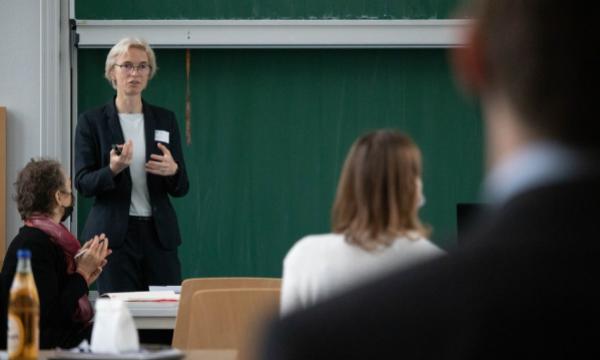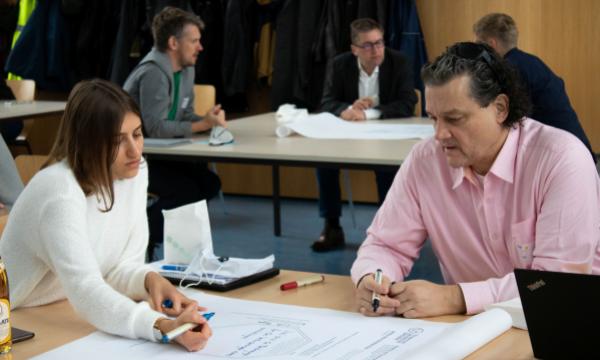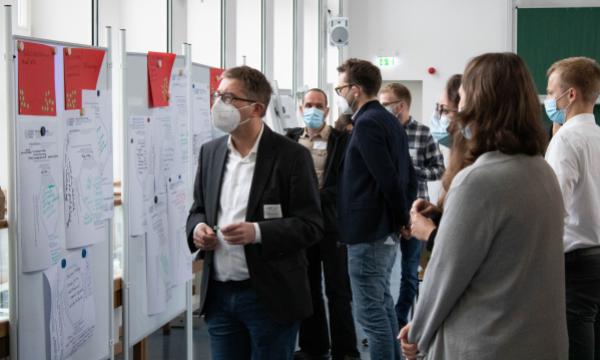
You are here
Exzellence Strategy at TU Dresden
"Automated and Networked mobility" and "Social Change" are two potential areas of TU Dresden. Engineers, transport and traffic scientists, humanities scholars and social scientists exchanged ideas and looked for overlaps.
What will the mobility of the future look like that not only meets the demands of the economy and everyday human life, but also those of the environment? What conditions must a sustainable and resilient transport infrastructure fulfil? In November 2021, scientists from the two Excellence University (ExU) potential areas "Automated and Networked Mobility" (ANM) and "Social Change" (SC) at TU Dresden addressed these and other questions. On the occasion of the "Mobility and Societal Change" networking studio, engineers, transport and traffic scientists, humanities scholars and social scientists met to exchange ideas and to jointly develop interdisciplinary questions and research ideas for the mobility of the future.
Opening with guest lecture: Does digitalisation change everything?
The evening before the Network Studio kicked off with the guest lecture "Does digitalisation change everything? Between path dependencies, possible disruptions and illusions" by Berlin mobility researcher Dr. habil. Weert Canzler. He once again highlighted the problems of motorised individual transport and showed various approaches to solutions based on global examples. He emphasised the necessity of interdisciplinary cooperation when dealing with such a comprehensive problem.
The network studio itself started the next morning in compliance with 3G rules in the drawing room of the Potthoff Building, the traditional faculty building of the Dresden Transport and Traffic Sciences.After a short welcome by the research officer of the potential area ANM, Anett Ludwig, and the scientific coordinator of the potential area SC, Dr Lucas von Ramin, Prof.in Regine Gerike (ANM) and Prof. Christian Prunitsch (SC) presented their potential areas and their current challenges.
Define mobility - and search for common research questions
The participants then got to know each other in interdisciplinary and alternating small groups. The task was to define their own concept of mobility and to develop initial ideas for common research questions. These ideas were clustered by the TUD Project Scouts Dr. Sebastian Schneider and Dr.-Ing. Rico Hickmann as well as the co-organiser of the event and scientific coordinator of the Centre for Integration Studies, Dr. Karoline Oehme-Jüngling. Eight thematic areas were identified:
- Transport of the Future - Visions
- Safe mobility
- Technical/social mobility/product development
- Political control/planning/governance
- Mobility narratives/mindsets
- Socially just mobility
- Sustainability
- Acceptance research
From these, the researchers democratically selected a maximum of five topics for further work.
In the second group work phase, the participants were divided into four of the selected clusters. There was one hour to deepen and further discuss the approaches. At the end of the work phase, presentations were made on the topics "Socially just mobility", "Transport of the future - visions", "Sustainability" and "Mobility narratives/mindsets".
Afterwards, the researchers evaluated the four draft ideas with regard to their potential for further development and continuation. All four topics received approval, as did the concept of the interdisciplinary network studio itself. All sides would like to see a continuation of the interdisciplinary cooperation and see great potential in research groups with such diverse expertise.
Excellence Strategy
The potential areas as well as the project scouts are measures of the Excellence Strategy of the TU Dresden. The Network Studio was funded by the Federal Ministry of Education and Research (BMBF) and the Free State of Saxony as part of the Excellence Strategy of the federal and state governments.
TU Dresden - Together. Excellent.
On 7 December 2020, the Extended Rectorate of TU Dresden and the spokespersons of the excellence clusters reported on the progress and challenges in implementing the excellence projects and presented perspectives for the way ahead.



